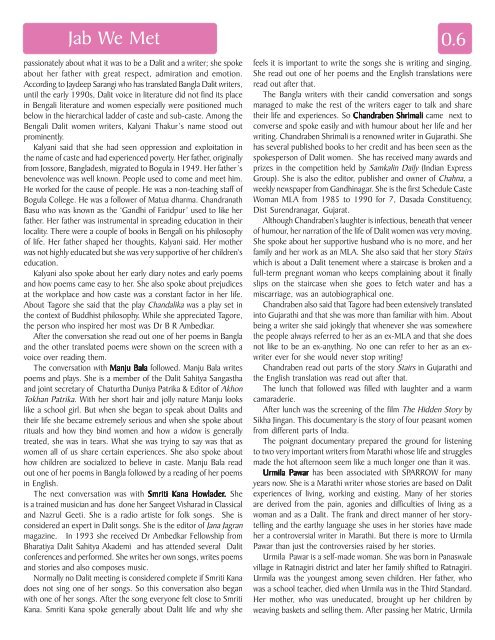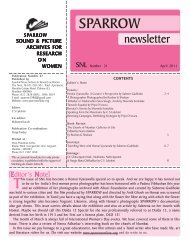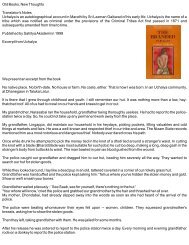SNL25-26_final for print.pmd - sparrow
SNL25-26_final for print.pmd - sparrow
SNL25-26_final for print.pmd - sparrow
- No tags were found...
You also want an ePaper? Increase the reach of your titles
YUMPU automatically turns print PDFs into web optimized ePapers that Google loves.
Jab We Metpassionately about what it was to be a Dalit and a writer; she spokeabout her father with great respect, admiration and emotion.According to Jaydeep Sarangi who has translated Bangla Dalit writers,until the early 1990s, Dalit voice in literature did not find its placein Bengali literature and women especially were positioned muchbelow in the hierarchical ladder of caste and sub-caste. Among theBengali Dalit women writers, Kalyani Thakur’s name stood outprominently.KalyaniProfileosaid that she had seen oppression and exploitation inthe name caste and had experienced poverty. Her father, originallyfrom Jossore, Bangladesh, migrated to Bogula in 1949. Her father’sbenevolence was well known. People used to come and meet him.He worked <strong>for</strong> the cause of people. He was a non-teaching staff ofBogula College. He was a follower of Matua dharma. ChandranathBasu who was known as the ‘Gandhi of Faridpur’ used to like herfather. Her father was instrumental in spreading education in theirlocality. There were a couple of books in Bengali on his philosophyof life. Her father shaped her thoughts, Kalyani said. Her motherwas not highly educated but she was very supportive of her children’seducation.Kalyani also spoke about her early diary notes and early poemsand how poems came easy to her. She also spoke about prejudicesat the workplace and how caste was a constant factor in her life.About Tagore she said that the play Chandalika was a play set inthe context of Buddhist philosophy. While she appreciated Tagore,the person who inspired her most was Dr B R Ambedkar.After the conversation she read out one of her poems in Banglaand the other translated poems were shown on the screen with avoice over reading them.The conversation with Manju Bala followed. Manju Bala writespoems and plays. She is a member of the Dalit Sahitya Sangasthaand joint secretary of Chaturtha Duniya Patrika & Editor of AkhonTokhan Patrika. With her short hair and jolly nature Manju lookslike a school girl. But when she began to speak about Dalits andtheir life she became extremely serious and when she spoke aboutrituals and how they bind women and how a widow is generallytreated, she was in tears. What she was trying to say was that aswomen all of us share certain experiences. She also spoke abouthow children are socialized to believe in caste. Manju Bala readout one of her poems in Bangla followed by a reading of her poemsin English.The next conversation was with Smriti Kana Howlader. Sheis a trained musician and has done her Sangeet Visharad in Classicaland Nazrul Geeti. She is a radio artiste <strong>for</strong> folk songs. She isconsidered an expert in Dalit songs. She is the editor of Jana Jagranmagazine. In 1993 she received Dr Ambedkar Fellowship fromBharatiya Dalit Sahitya Akademi and has attended several Dalitconferences and per<strong>for</strong>med. She writes her own songs, writes poemsand stories and also composes music.Normally no Dalit meeting is considered complete if Smriti Kanadoes not sing one of her songs. So this conversation also beganwith one of her songs. After the song everyone felt close to SmritiKana. Smriti Kana spoke generally about Dalit life and why she0.6feels it is important to write the songs she is writing and singing.She read out one of her poems and the English translations wereread out after that.The Bangla writers with their candid conversation and songsmanaged to make the rest of the writers eager to talk and sharetheir life and experiences. So Chandraben Shrimali came next toconverse and spoke easily and with humour about her life and herwriting. Chandraben Shrimali is a renowned writer in Gujarathi. Shehas several published books to her credit and has been seen as thespokesperson of Dalit women. She has received many awards andprizes in the competition held by Samkalin Daily (Indian ExpressGroup). She is also the editor, publisher and owner of Chahna, aweekly newspaper from Gandhinagar. She is the first Schedule CasteWoman MLA from 1985 to 1990 <strong>for</strong> 7, Dasada Constituency,Dist Surendranagar, Gujarat.Although Chandraben’s laughter is infectious, beneath that veneerof humour, her narration of the life of Dalit women was very moving.She spoke about her supportive husband who is no more, and herfamily and her work as an MLA. She also said that her story Stairswhich is about a Dalit tenement where a staircase is broken and afull-term pregnant woman who keeps complaining about it <strong>final</strong>lyslips on the staircase when she goes to fetch water and has amiscarriage, was an autobiographical one.Chandraben also said that Tagore had been extensively translatedinto Gujarathi and that she was more than familiar with him. Aboutbeing a writer she said jokingly that whenever she was somewherethe people always referred to her as an ex-MLA and that she doesnot like to be an ex-anything. No one can refer to her as an exwriterever <strong>for</strong> she would never stop writing!Chandraben read out parts of the story Stairs in Gujarathi andthe English translation was read out after that.The lunch that followed was filled with laughter and a warmcamaraderie.After lunch was the screening of the film The Hidden Story bySikha Jingan. This documentary is the story of four peasant womenfrom different parts of India.The poignant documentary prepared the ground <strong>for</strong> listeningto two very important writers from Marathi whose life and strugglesmade the hot afternoon seem like a much longer one than it was.Urmila Pawar has been associated with SPARROW <strong>for</strong> manyyears now. She is a Marathi writer whose stories are based on Dalitexperiences of living, working and existing. Many of her storiesare derived from the pain, agonies and difficulties of living as awoman and as a Dalit. The frank and direct manner of her storytellingand the earthy language she uses in her stories have madeher a controversial writer in Marathi. But there is more to UrmilaPawar than just the controversies raised by her stories.Urmila Pawar is a self-made woman. She was born in Panaswalevillage in Ratnagiri district and later her family shifted to Ratnagiri.Urmila was the youngest among seven children. Her father, whowas a school teacher, died when Urmila was in the Third Standard.Her mother, who was uneducated, brought up her children byweaving baskets and selling them. After passing her Matric, Urmila




